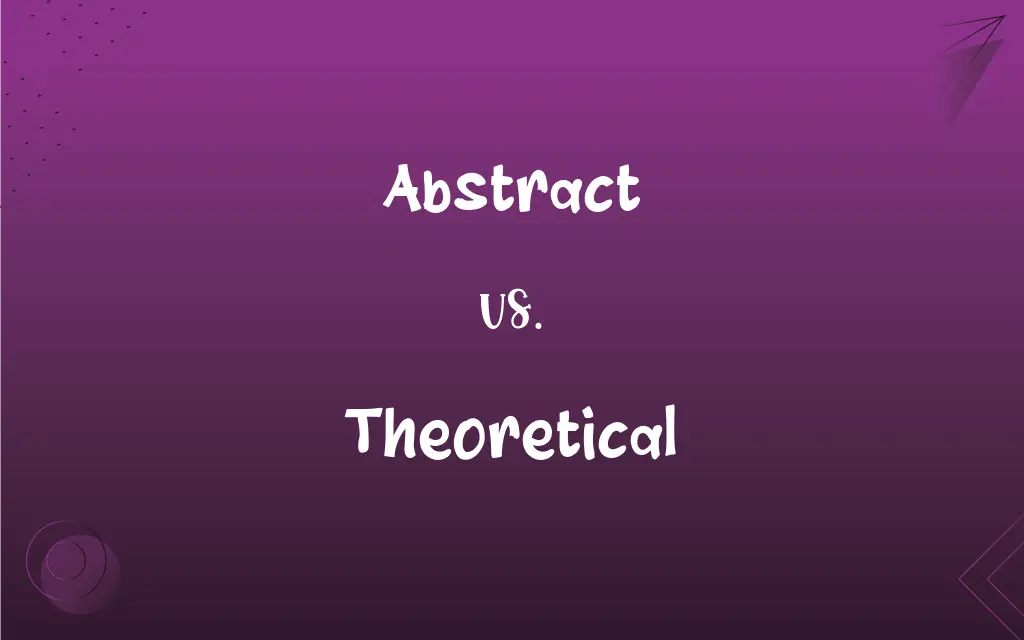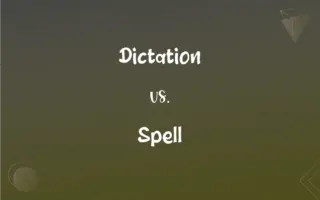Abstract vs. Theoretical: What's the Difference?
By Janet White || Updated on May 23, 2024
Abstract refers to ideas that are not concrete or tangible, while theoretical pertains to ideas based on theory rather than practice or experience.

Key Differences
Abstract concepts are those that do not have a physical or concrete existence. These ideas are often generalized and broad, such as beauty, love, or freedom. Theoretical concepts, on the other hand, are rooted in a systematic framework of principles and hypotheses. They are often used to explain phenomena within a specific field of study.
Abstract thinking involves processing complex ideas without relying on concrete references. This form of thinking is crucial in arts and philosophy. In contrast, theoretical thinking relies on established theories and is more common in scientific and academic disciplines. It involves constructing models to predict and explain various phenomena.
In art, abstract works may not represent reality directly, focusing instead on form, color, and line to convey meaning. Theoretical work in art might analyze the methods and principles behind different styles and movements. Abstract art challenges perception, while theoretical art studies provide a structured interpretation of artistic trends.
In scientific contexts, abstract refers to summaries of research articles, giving a brief overview of the main points. Theoretical work in science involves creating frameworks or models to explain observed phenomena. Abstracts help summarize findings, whereas theoretical frameworks guide research and hypothesis testing.
Comparison Chart
Nature
General, non-tangible ideas
Ideas based on systematic theories
ADVERTISEMENT
Thinking Style
Broad and conceptual
Structured and model-based
Usage in Art
Focuses on form, color, and line
Analyzes methods and principles
Scientific Context
Summaries of research articles
Frameworks to explain phenomena
Practical Application
Less direct
Often used to guide practical research
Abstract and Theoretical Definitions
Abstract
Summary of a research paper.
The abstract of the study highlighted the key findings on climate change.
ADVERTISEMENT
Theoretical
Based on or involving theory.
The theoretical framework guided the study's methodology.
Abstract
Existing in thought but not having a physical presence.
Love is often considered an abstract emotion.
Theoretical
Concerned with theories rather than practical application.
His interest is more theoretical than practical.
Abstract
Considered apart from concrete existence
An abstract concept.
Theoretical
Hypothetical and speculative.
Theoretical physics explores concepts beyond our current reality.
Abstract
Not applied or practical; theoretical.
Theoretical
Relating to the abstract principles of a subject.
The course covered the theoretical aspects of linguistics.
Abstract
Difficult to understand; abstruse
Abstract philosophical problems.
Theoretical
Systematic and organized in nature.
Theoretical models are essential in scientific research.
Abstract
Denoting something that is immaterial, conceptual, or nonspecific, as an idea or quality
Abstract words like truth and justice.
Theoretical
Of, relating to, or based on theory.
Abstract
Impersonal, as in attitude or views.
Theoretical
Restricted to theory; not practical or applied
Theoretical physics.
Abstract
Having an intellectual and affective artistic content that depends solely on intrinsic form rather than on narrative content or pictorial representation
Abstract painting and sculpture.
Theoretical
Studying or working to develop theory.
Abstract
A statement summarizing the important points of a text.
Theoretical
Of or relating to theory; abstract; not empirical.
Abstract
Something abstract.
Theoretical
Concerned primarily with theories or hypotheses rather than practical considerations;
Theoretical science
Abstract
An abstract of title.
Theoretical
Concerned with theories rather than their practical applications;
Theoretical physics
Abstract
To take away; remove
Abstract the most important data from a set of records.
Theoretical
Based on specialized theory;
A theoretical analysis
Abstract
To remove without permission; steal
A painting that was abstracted from the museum.
Abstract
To consider (an idea, for example) as separate from particular examples or objects
Abstract a principle of arrangement from a series of items.
Abstract
(ăbstrăkt′) To write a summary of; summarize
Abstract a long article in a paragraph.
Abstract
To create artistic abstractions of (something else, such as a concrete object or another style)
"The Bauhaus Functionalists were ... busy unornamenting and abstracting modern architecture, painting and design" (John Barth).
Abstract
An abridgement or summary of a longer publication.
Abstract
Something that concentrates in itself the qualities of a larger item, or multiple items.
Abstract
Concentrated essence of a product.
Abstract
(medicine) A powdered solid extract of a medicinal substance mixed with lactose.
Abstract
An abstraction; an abstract term; that which is abstract.
Abstract
The theoretical way of looking at things; something that exists only in idealized form.
Abstract
(arts) An abstract work of art.
Abstract
(real estate) A summary title of the key points detailing a tract of land, for ownership; abstract of title.
Abstract
(obsolete) Derived; extracted.
Abstract
Drawn away; removed from; apart from; separate.
Abstract
Not concrete: conceptual, ideal.
Her new film is an abstract piece, combining elements of magic realism, flashbacks, and animation but with very little in terms of plot construction.
Abstract
Insufficiently factual.
Abstract
Apart from practice or reality; vague; theoretical; impersonal; not applied.
Abstract
(grammar) As a noun, denoting a concept or intangible as opposed to an object, place, or person.
Abstract
Difficult to understand; abstruse; hard to conceptualize.
The politician gave a somewhat abstract answer when asked about their plans to cut spending.
Abstract
Separately expressing a property or attribute of an object that is considered to be inherent to that object: attributive, ascriptive.
Abstract
Pertaining comprehensively to, or representing, a class or group of objects, as opposed to any specific object; considered apart from any application to a particular object: general, generic, nonspecific; representational.
Abstract
(archaic) Absent-minded.
Abstract
(arts) Pertaining to the formal aspect of art, such as the lines, colors, shapes, and the relationships among them.
Abstract
Free from representational qualities, in particular the non-representational styles of the 20th century.
Abstract
(music) Absolute.
Abstract
(dance) Lacking a story.
Abstract
Being a partial basis for subclasses rather than a complete template for objects.
Abstract
(transitive) To separate; to disengage.
Abstract
(transitive) To remove; to take away; withdraw.
Abstract
To steal; to take away; to remove without permission.
Abstract
(transitive) To summarize; to abridge; to epitomize.
Abstract
To conceptualize an ideal subgroup by means of the generalization of an attribute, as follows: by apprehending an attribute inherent to one individual, then separating that attribute and contemplating it by itself, then conceiving of that attribute as a general quality, then despecifying that conceived quality with respect to several or many individuals, and by then ideating a group composed of those individuals perceived to possess said quality.
Abstract
To extract by means of distillation.
Abstract
(transitive) To consider abstractly; to contemplate separately or by itself; to consider theoretically; to look at as a general quality.
Abstract
To withdraw oneself; to retire.
Abstract
(transitive) To draw off (interest or attention).
He was wholly abstracted by other objects.
Abstract
To perform the process of abstraction.
Abstract
To create abstractions.
Abstract
To produce an abstraction, usually by refactoring existing code. Generally used with "out".
He abstracted out the square root function.
Abstract
Withdraw; separate.
The more abstract . . . we are from the body.
Abstract
Considered apart from any application to a particular object; separated from matter; existing in the mind only; as, abstract truth, abstract numbers. Hence: ideal; abstruse; difficult.
Abstract
Expressing a particular property of an object viewed apart from the other properties which constitute it; - opposed to concrete; as, honesty is an abstract word.
A concrete name is a name which stands for a thing; an abstract name which stands for an attribute of a thing. A practice has grown up in more modern times, which, if not introduced by Locke, has gained currency from his example, of applying the expression "abstract name" to all names which are the result of abstraction and generalization, and consequently to all general names, instead of confining it to the names of attributes.
Abstract
Abstracted; absent in mind.
Abstract
To withdraw; to separate; to take away.
He was incapable of forming any opinion or resolution abstracted from his own prejudices.
Abstract
To draw off in respect to interest or attention; as, his was wholly abstracted by other objects.
The young stranger had been abstracted and silent.
Abstract
To separate, as ideas, by the operation of the mind; to consider by itself; to contemplate separately, as a quality or attribute.
Abstract
To epitomize; to abridge.
Abstract
To take secretly or dishonestly; to purloin; as, to abstract goods from a parcel, or money from a till.
Von Rosen had quietly abstracted the bearing-reins from the harness.
Abstract
To separate, as the more volatile or soluble parts of a substance, by distillation or other chemical processes. In this sense extract is now more generally used.
Abstract
To perform the process of abstraction.
I own myself able to abstract in one sense.
Abstract
That which comprises or concentrates in itself the essential qualities of a larger thing or of several things. Specifically: A summary or an epitome, as of a treatise or book, or of a statement; a brief.
An abstract of every treatise he had read.
Man, the abstractOf all perfection, which the workmanshipOf Heaven hath modeled.
Abstract
A state of separation from other things; as, to consider a subject in the abstract, or apart from other associated things.
Abstract
An abstract term.
The concretes "father" and "son" have, or might have, the abstracts "paternity" and "filiety."
Abstract
A powdered solid extract of a vegetable substance mixed with sugar of milk in such proportion that one part of the abstract represents two parts of the original substance.
Abstract
A concept or idea not associated with any specific instance;
He loved her only in the abstract--not in person
Abstract
A sketchy summary of the main points of an argument or theory
Abstract
Consider a concept without thinking of a specific example; consider abstractly or theoretically
Abstract
Make off with belongings of others
Abstract
Consider apart from a particular case or instance;
Let's abstract away from this particular example
Abstract
Give an abstract (of)
Abstract
Existing only in the mind; separated from embodiment;
Abstract words like `truth' and `justice'
Abstract
Not representing or imitating external reality or the objects of nature;
A large abstract painting
Abstract
Based on specialized theory;
A theoretical analysis
Abstract
Dealing with a subject in the abstract without practical purpose or intention;
Abstract reasoning
Abstract science
Abstract
Generalized idea not linked to physical reality.
Beauty is an abstract concept that varies among cultures.
Abstract
Non-concrete thinking.
Her abstract thinking led to innovative solutions.
Abstract
Artistic style focusing on form and color.
The gallery featured several abstract paintings.
FAQs
Can an abstract concept be part of a theory?
Yes, abstract concepts can form the foundation of a theoretical framework, providing broad ideas that theories aim to explain.
How is abstract thinking different from theoretical thinking?
Abstract thinking involves broad, non-concrete ideas, while theoretical thinking relies on systematic theories and models.
How does abstract art differ from theoretical art analysis?
Abstract art focuses on non-representational forms and colors, while theoretical art analysis examines the principles and methods behind art styles.
Why is abstract thinking important in philosophy?
Abstract thinking allows philosophers to explore and discuss complex, non-tangible ideas such as morality, existence, and knowledge.
What is an abstract in scientific research?
An abstract is a summary of a research article, outlining the main objectives, methods, results, and conclusions.
What does abstract mean in general terms?
Abstract refers to ideas that are not physical or concrete, often representing broad and generalized concepts.
What is a theoretical framework?
A theoretical framework is a structured set of concepts and propositions that guide research and analysis within a specific field.
Is theoretical always practical?
No, theoretical ideas are often speculative and may not have immediate practical applications.
Can something be both abstract and theoretical?
Yes, many theoretical concepts are abstract, as they often involve ideas that are not physically tangible.
How do theoretical principles impact scientific research?
Theoretical principles guide the formulation of hypotheses and the interpretation of research findings.
Can theoretical concepts be proven?
Theoretical concepts can be tested and supported by evidence, but they often remain speculative without concrete proof.
How do abstract and theoretical ideas contribute to innovation?
Abstract ideas inspire creative thinking, while theoretical ideas provide structured approaches for practical applications.
What is an example of an abstract idea?
Freedom is an abstract idea that encompasses various meanings and interpretations.
How are theoretical models used in science?
Theoretical models help scientists predict and explain phenomena, guiding experimental design and hypothesis testing.
What is the main difference between abstract and theoretical in art?
Abstract art emphasizes form and color without direct representation, whereas theoretical art examines the underlying principles and methods.
What role do abstracts play in academic papers?
Abstracts provide a concise summary of the main points of academic papers, helping readers quickly grasp the content.
Why are abstracts important in scientific literature?
Abstracts allow researchers to quickly understand the essence of a study, facilitating the review and dissemination of scientific knowledge.
Is abstract art purely random?
No, abstract art often follows specific artistic principles and conveys meaning through form and color, despite lacking direct representation.
What makes a concept abstract?
A concept is abstract if it exists in thought and is not directly tied to physical reality.
What is an example of a theoretical principle?
The law of gravity is a theoretical principle explaining the attraction between objects with mass.
About Author
Written by
Janet WhiteJanet White has been an esteemed writer and blogger for Difference Wiki. Holding a Master's degree in Science and Medical Journalism from the prestigious Boston University, she has consistently demonstrated her expertise and passion for her field. When she's not immersed in her work, Janet relishes her time exercising, delving into a good book, and cherishing moments with friends and family.































































